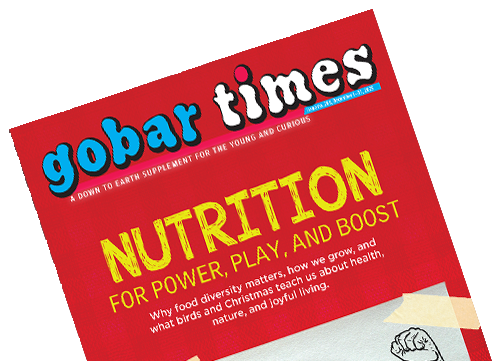
Showcasing how visionary projects can nurture future leaders who are not only academically adept but also environmentally conscious and aware. ***************************** In an era of urbanization and technological advancements, the importance of connecting the youngsters with nature cannot be overstated. My school, the Sacred Heart in Kalyan, Maharashtra, stands as a beacon of inspiration in this regard. Their authorities had given me the mandate to set up a butterfly garden and provided all the required finance and manpower. And as our pioneering effort flourished with time, I was duly absorbed as a Nature educator...

Become a smart consumer by learning how to pick out the truly ‘Organic’ stuff from amongst a host of food packets carrying various complicated labels. ***************************** Hello, friends! The other day, I went grocery shopping with my niece, Prisha, for buying some chemical-free and safe food. She’s just like you, always eager to learn new things. As we walked through the store, Prisha explored all kinds of fruits, spices, chocolates, and whatnot! But something really confused her—lots of description on the products she’d picked up...

What is the truth behind India's honey? How pure is the honey made by your favourite brand? Are you eating nature's wonder food or are the companies selling you cheap and unhealthy sugar? To find these answers let us look at the latest report by the Delhi based Centre for Science and Environment or CSE. CSE has earlier exposed pesticides in colas and packaged drinking water, antibiotics in honey, GMO's in packaged food, and excess salts and trans fat in junk foods...

Bees are indispensable pollinators and exist in all types of climate—from forests in Europe, deserts in Africa to the Arctic Circle. But what would happen if all of them just disappeared one day? Here's a look. ******************************************* What if one day you step into your house and find there is no food. The refrigerator is empty and you switch on the television to know more. A news channel tells you that there is a food crisis and the reason for this is that there are no bees left in the world...

Genetic engineering is used to modify the food we eat. But do we know enough about its effect on us? For as long as we know, the food we eat is grown in farms and fields by farmers who sow seeds and harvest them every season. Adulterations in food products sold loose, such as pulses or sugar in the local kirana stores, is quite common. But we never worry about adulterations while buying packaged food from the shelves of our favourite shop. After all, they pass through several quality checks. But a study by Delhi-based non-profit Centre for Science and Environment (CSE) has found that packaged food items have genetically …

This is the age of hard sell: everything that is or can be on sale, is being sold aggressively through promotions, advertisements, media campaigns, claims of how good the product is, what health benefits it supposedly has, etc... and that also goes for the food that we eat.

